#Pauli Murray
Explore tagged Tumblr posts
Text

Born in the USA in 1910, Pauli Murray was assigned female at birth, but was in his own words “...one of nature’s experiments, a girl who should’ve been a boy…” Pauli spent his life fighting for the rights of women and Black people in the USA. His groundbreaking legal theories and ideas about intersectionality remain as important today as they were over 50 years ago.
Check out our podcast on Pauli to learn more
[Image source]
#black history month#pauli murray#queer history#black history#trans history#lgbt#queer#lgbtq#lgbt history
620 notes
·
View notes
Text
Trans historical slideshow college with my favorite trans quotes some of people in slideshow not all but the ones I saved names of Frances Thompson, Marsha p Johnson,pauli Murray, Sylvia Rivera,Lou Sullivan, James Barry, Wendy Carlos,Lucy hicks, Rupert raj, frank woodhull,Bambi, Jackie Shane, little axe,coccinlelle,April
#transgender representation#trans history#trans rights#trans artwork#trans artist#trans poetry#trans quotes#lou sullivan#pauli murray#marsha p johnson#lgbt history#trans people#trans people have always existed#trans day of visibility
77 notes
·
View notes
Text
Harriet said "Hold on"
Zora said "Kinfolk over skinfolk"
Pauli said "Hope is a song"
Fannie said "sick n' tired of bein sick n' tired"
Rosa said "Nah"
Audre said "Enuf"
Cori said "Fuck fascism"
#tag black women who paved the way#black lives matter#cori bush#angela davis#toni morrison#mary church Terrell#ida b. wells#fannie lou hamer#rosa parks#zora neale hurston#pauli murray#audre lorde#lorraine hansberry#lupita nyong'o#angela bassett#ava duvernay#audra mcdonald#our world#ecosystem of white supremacy#politics#history#padawan historian
1K notes
·
View notes
Text
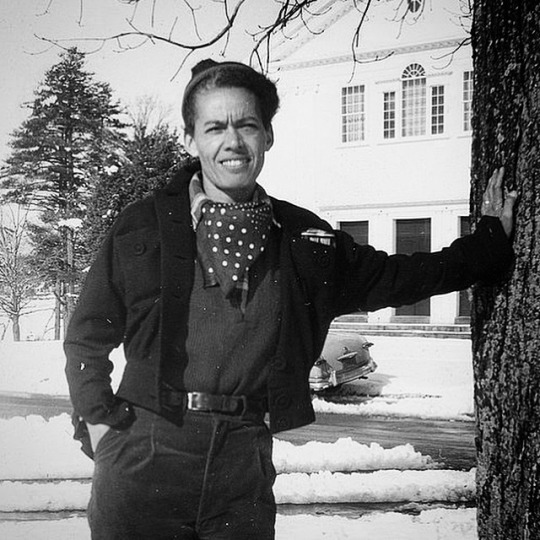
Today We Honor Pauli Murray
At 30 years old, Pauli Murray was arrested for violating segregation laws in Virginia by sitting in the “whites-only” section of the bus. This incident, among others, sparked her passion for civil rights work.
She enrolled at Howard University’s law school and graduated at the top of her class. Despite her outstanding academic achievements, she was denied the opportunity to do post-graduate work at Harvard, which she believed was due to her gender and race. This didn’t deter her, though, and she graduated from Yale Law School in 1965. Murray later wrote the influential book, States’ Laws on Race and Color, which served as an encyclopedia of all the states’ laws concerning race.
In recognition of her pioneering work in gender discrimination, Ruth Bader Ginsburg named her as a coauthor in the Supreme Court Case Reed vs Reed.
CARTER™️ Magazine
#pauli murray#carter magazine#historyandhiphop365#wherehistoryandhiphopmeet#history#cartermagazine#today in history#staywoke#blackhistory#blackhistorymonth#carter
130 notes
·
View notes
Text

I have been enslaved, yet my spirit is unbound. I have been cast aside, but I sparkle in the darkness. I have been slain but live on in the rivers of history. Pauli Murray, "Prophecy" in Dark Testament And Other Poems (1970)
16 notes
·
View notes
Text

Pauli Murray bust by Maysie Stone, 1933
https://via.library.depaul.edu/cgi/viewcontent.cgi?article=1256&context=etd
#pauli murray#maysie stone#bust#black nonbinary lesbians#black gender nonconforming lesbians#nonbinary lesbians#gender nonconforming lesbians#nonbinary#gender nonconforming#gender noncomformity
22 notes
·
View notes
Text

Pauli Murray, b. November 20, 1910 / 2024
(image: Pauli Murray, early 1960s. Schlesinger Library, Radcliffe Institute for Advanced Study, Harvard University, Cambridge, MA)
#photography#pauli murray#birthday anniversary#schlesinger library#radcliffe institute#1910s#1960s#2020s
9 notes
·
View notes
Text
Notes on Autobiography of Pauli Murray

The name of this text is Pauli Murray: The Autobiography of a Black Activist, Feminist, Lawyer, Priest, and Poet formerly title Song in a Weary Throat: An American Pilgrimage. This is the 3rd paperback edition printed in 1997
The following notes are mainly quotes from the book related to specific subjects. Pauli Murray was a Black, queer, likely trans person who left an indelible mark on this world and greatly influenced the Civil Rights and Human Rights movements in the USA and beyond. She or they (there is controversy about what pronouns Pauli may have used in this day and age) were a courageous trailblazer. I would say, Pauli Murray is one of my heroes. I cry reading their words and hearing about their story.
I am currently on chapter 13 of 35 and will add quotes and notes as I continue.
The quotes are separated by subject as I have determined.
On gender and queerness
"My talents never included handicraft...the divisions of labor in our household was such that I did not cook. I would have enjoyed working with a hammer and tools, but cooking and sewing seemed beyond me..." (p 22)
"At home...[my] duties were to split and stack endless loads of wood and kindling, keep all the rooms supplied with scuttles of coal...feed the chickens...clean wicks and chimneys...scrub the outhouse, white wash the trees and fences...hoe the garden, cut down weeds..." (p 22)
For pay PM would clean her aunts house for 25¢. Pm also had a newspaper rout earning up to $1.30
On disability
"Grandfather's blindness did not prevent him from contributing to the family enterprises...In the springtime he would prune the grapevines so that each new crop of grapes would be large and juice." (p 21)
"My initial assignment was a teacher on the WPA Remedial Reading Project...Remedial reading was then a new concept...I had only 2 or 3 children in my classroom at any one time. Each child was tested for his or her particular reading disabilities, and then I constructed a set of reading materials for that child's individual use...the children did not have to compete with each other, only with their own records." (p 100 - 101)
This sounds like an early version of Special Education programs and individualized education plans
PM noted many educator did not fund value in the program or used it as a way to get rid of "discipline" problems....The latter is something echoed today especially with students labeled under EBD
PM mentioned feeling isolated from professional collegues in part because of the program goals (helping students with reading disabilities) and in part because it was a WPA project...likely similar to "professional educators" today response to Teach For America or similar programs.
On protest/resistance/rebellion
"My aunts were "Race women" of their time. They took pride in every acheivment of "the race" and agonized over every lynching..." (p 30)
"I carried on my own private protest. I walked almost everywhere to stay off the Jim Crow streetcars and I would not go downtrown to the theaters because that meant climbing the back stairs to the colored "peanut gallery". (p 32)
Pauli Murray reflects on their childhood in Durham, NC and the ways they avoided subjecting themselves to the humiliations of segregation and Jim Crow laws and policies.
"I had cast my first vote in the election of 1932, and it was a vote of protest. Since I would not vote Republican and, having lived under the apartheid of Democratic rule in the "solid South, could not bring myself to vote for a Democrat, I had voted for the Socialist candidate, Norman Thomas." (p 93)
"For all my bravado, deeply engrained notions of respectability filled me with distress. It was one thing to ride freights anonymously or sleep in jails in strange towns where I was unknown. It was quite another to carry a picket sign in the heart of Harlem, where many people knew me. I felt as if I had been asked to parade in public undressed..." (p 99)
This quote is a reflection of PM's first picket line. Joined in support of friend, Ted Poston, who was picketing a Black weekly paper, New York Amsterdam News. Ted and others had organized a local unit of the American Newspaper Guild. He had been arrested previously for picketing. PM was arrested at this picket line but the judge dismissed their case.
Labor protest at this time are in line with history I have studied in Minneapolis about Black labor movements during this era.
"Pee Wee had an amazing sense of her own worth, and she feared no one. Her strong convictions about civic responsibilities lef her to write long letters to public officials [over social concerns]...I owe Pee Wee's example my later habit of writing to newspapers and public figures on social issues, letters I came to call "confrontation by typewriter." (p 96
On the nearness of Slavery
"Racial lines, which had been blurred to some extent during Reconstruction, were now being drawn ighter by the wave of segregation laws enacted by southern states in the wake of the 1896 Plessy decision, which validated the doctrine of "separate but equal." (p. 14)
"On the all [in Pauli's childhood home in Durham, North Carolina] above the cross hung Miss Mary Ruffin Smith's painting of a mother of pearl fountain cascading from a silver basic. Grandmother Cornelia gave this painting an honored place in our household as a testimony to the strong bond of affection that had existed between her and the antebellum who had been both her blood relative and legal owner." (p. 19)
"...but Grandfather's tiny pension from his Civil War service was little more than enough to keep up the taxes." (p. 21)
Pauli's childhood home included her grandparents and Aunt Pauline and was owned by her Grandparents
"The preservation of the Negro cultural heritage was another important aspect of WPA activity. Interviews conducted with many former slaves preserved their firsthand stories before they passed from the scene." (p. 100)
Pauli is discussing her recollection of Works Progress Administration program that was focused on collecting and recording the history of living formerly enslaved people.
When Pauli Murray (PM) was 5 years old they participated in a play called "Fifty Years of Freedom" put on by an organization her aunts, who were race women, participated in. Later, they (PM) found an earlier version of the play titled "Thirty Years of Freedom" likely put on in 1890.
"In our segregated world, we had a sense of identity and a sense of racial pride, fragile though they might be. We were close to the roots of our immediate past because many elderly people still alive who had been born in slavery." (p 31)

[Pauli Murray's Grandmother Cornelia]
On passing
"...Pauline Fitzgerald [Aunt Pauline] married young, blond, blue eyed Charles Morton Dame, fresh from Howard University Law School but they had not reckoned with the formidable barriers to the success practice of law by a colored man...The best young Dame could do was to earn a few dollars...writing wills and deeds for white attorneys, income supplemented by his wife's meager earnings as a teacher...
Some of the white men for whom he worked told him flatly that he would never get anywhere as a colored lawyer..."You're as white as any white man...and you'll have a better chance if you cross the line..."
...the temptation to end a grubbing existence finally overpowered Charles Dame. He told his wife what he had decided to do and tried to persuade her to join him. She, too, looked indistinguishable from a Caucasian, and the two of them would have had little difficulty fading into the white background. Aunt Pauline's refusal brought an end to their marriage." (p 14 - 15)
Aunt Pauline was married around 1899
"During the first half century after Emancipation, thousands of near whites exercised this option to escape racial oppression..." (p 15)
"Once when a fair skinned form the North came to visit and took me to town one day for company, she made me stand outside while she went into the stores on Main Street. She said they would give her better service if they did not know she was colored. (p 32)
Pauli, like many Black Americans*, is of a mixed, multiracial, multiethnic background. This included African, European and Native American heritage. Their relatives, like many Black Americans, had relatives who ranged in skin color from deep, dark skin to fair, pale skin.
Pauli's Aunt Pauline, who is also her namesake and legal guardian, was greatly offended by this relative's actions and did not allow Pauli to interact with them privately moving forward.
*Black Americans on this blog refers to people of African descent who survived USA chattel slavery, the maafa and have lived in the USA for the last several hundred years.
"It was no secret that my fairer-skinned relatives indulged in casual "passing"...in their pragmatic view it was not disloyalty to "the race"...Curiously enough, my relatives from the South did not bother to pass where segregation was most oppressive, but sometimes did in the North, where they were unknown and jobs were at stake. (p 34)
PM mentions a story where her Aunt Marie/Maria passed in the North for higher wages, but did not pass in the South and lived as a negro while working in the colored county schools (p 34)
"Some girls married Italian men and disappeared completely from the colored race. Others "passed" sporadically, working white collared jobs..." (p 35)
PM talks of a cousin who would bleach his hair blonde and another who wore wigs to cover his "kinky coils" (and was eventually found out by a white woman caller)
PM also tells the story of Amos Burton, who they name as the first Negro professional baseball player, was known to be colored in his hometown but known nationally (p 35)
On segregation
"College graduates were hit hard as other groups...the New York Times reported an estimated 10,000 unemployed college graduates in New York City...One could spot several women on any floor at Macy's wearing the Hunter College ring -- that is, if they were white. Negroes were limited to elevator and cleaning jobs whether they had a degree or not." (p 92)
When Pauli intially visited NYC as a child/teen they commented on how free it felt compared to Durham, NC. Their experiences after moving there quickly highlight that the colorline was still in place if more liberal...This highlights that segregation, though not always enshrined in law in Northern states and cities, was still a firm practice
"[Great Uncle Richard] had defied custom and bought the property in the face of fierce opposition from white people. It was said in the family that a white businessman named Tom Walker had fallen out with some of his asociates and settled his grudge by selling his home to a colored man." (p 29)
"In our segregated world, we had a sense of identity and a sense of racial pride, fragile though they might be. We were close to the roots of our immediate past because many elderly people still alive who had been born in slavery." (p 31)
"It was confusing to me because I was both related to white people and alienated from them." (p 31)
"While this discriminating assessment of he whie population prevented me from developing a blanket hatred of all white people, there was a threshold reserve which applied to the white world generally." (p. 31)
"white aristocrats" were cool to PM's family, they were "nice white people"
"mean, prejudiced white republicans" which Pm compares to the contemporary (at the time the book was written) "whitey" and "honkie"
PM did not/was not allowed to greet white people on their porch even their neighbors
"My meager contact with white people was paradoxical, since the two races lived close together, and, within the limits of the strict racial code...My family prederred never to cross the gulf that separated us from white people unless we could do so without lsing our dignity and pride." (p 34)
"It was a straitjacket existence, which became more oppressive as I grew older." (p 34)
"The only hope for me to go to college, it seemed, was to matriculate at the North Carolina College for Negroes in Durham. Since I was determined not to attend a segregated college, this prospect prompted my first overt stand against racial segregation. " (p 65)
"...the overriding purpose of segregation was to humiliate and degrade colored people." (p 109)
"During [FDR's] 6 years he had been in the White House, I had become increasingly dismayed over his apparent coziness with white supremacy in the South, his silence on civil rights and his refusal to speak out for a federal antilynching bill, which the NAACP had modestly proposed." (p 111)
4 notes
·
View notes
Text
All of my icon-drawing, meme-making, and queer Christian history research has led to this moment:
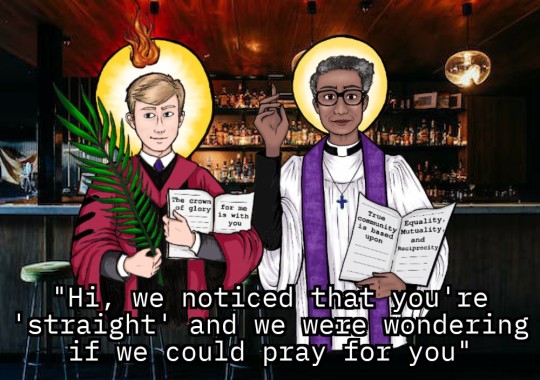
The unstoppable tag team of the Reverend Doctor Pauli Murray and Professor John Boswell, King and Queen of gender and sexuality, 20th century queer elders and patron saints of LGBTQ Christians, have destroyed the cisheteropatriarchy once and for all
(They've also seen our online queer discourse and they're not impressed)
24 notes
·
View notes
Text
#30DaysofPride: Day 8- Rev. Dr. Pauli Murray
Disclaimer: if I use They and s/he in the same sentence, assume I’m talking about the same person. “Pauli Murray’s personal writings about her gender identity and sexuality have been a recent topic of study. Gender studies scholars are now acknowledging that were Murray living today, she may have identified as a transgender man.” –Pauli Murray as a LGBTQ+ Historical Figure, Smithsonian National…

View On WordPress
#30DaysOfPride#activism#Black Queer History#Civil Rights#lgbt#LGBTQIA#Pauli Murray#queer#queerhistory#trans#trans history#visibility
7 notes
·
View notes
Text
Queer hero
I plan on doing a series on my favorite historical trans people 😄
I'm using all pronouns for them btw
Pauli Murray was the first African American to earn a J.S.D. from Yale Law School,
the first Black "woman," ordained as an Episcopal priest, and a co-founder of the National Organization for Women
They taught at Brandeis University, becoming the first person to teach African-American Studies and Women's Studies there.
he advocated for the inclusion of the word "sex" in the Civil Rights Act of 1964. She was cited as an honorary co-author of the amicus brief in Reed v. Reed (1971), which addressed the failure of courts to recognize sex discrimination.
“Should the Civil Rights Cases and Plessy v. Ferguson Be Overruled?” (1944) used incase of Brown v. Board of Education
Murray joined the American Civil Liberties Union (ACLU) board of directors in 1965.
and Civil Rights Activism
Murray's legal work and scholarship, including the concept of "Jane Crow" to describe the intersecting discrimination against Black women, discrimination.
Murray challenged racial segregation in education and public transit, including organizing a sit-in that desegregated a restaurant in Washington, D.C.
he was arrested for refusing to move to the back of a bus in Durham, North Carolina.
Murray's book, States' Laws on Race and Color, was considered the "Bible" for civil rights litigators.
Murray self-described as a “he/she personality” in correspondence with family members. For years, Murray requested - and was denied - testosterone injections and hormone therapy, as well as exploratory surgery to investigate their reproductive organs, believing that they may have been intersex and had undescended testis.
Graduating in 1933 amid the Great Depression, Murray soon joined thousands to ride the rails searching for work. With a short bob and slender body that they described as “flat in the obvious places,” Murray presented as a small teenage boy, going by names like “Pete” and “The Dude.”
"I don't know whether I'm right or whether society (or some medical authority) is right. I only know how I feel and what makes me happy. This conflict rises up to knock me down at every apex I reach in my career. And because the laws of society do not protect me, I'm exposed to any enemy or person who may or may not want to hurt me."
Pauli Murray wrote about his gender identity and sexuality throughout her life. In their journals, Murray wondered if she was "one of nature's experiments; a girl who should have been a boy." Partially because of this struggle, Murray suffered breakdowns and was hospitalized throughout her twenties and thirties. Murray sought medical treatment and consulted doctors concerning what they called “an inverted sex instinct,”
Some further reading //some sources
https://www.paulimurraycenter.com/pronouns-pauli-murray
https://nmaahc.si.edu/explore/stories/pauli-murray-lgbtq-historical-figure
https://en.m.wikipedia.org/wiki/Pauli_Murray
6 notes
·
View notes
Text

When Pauli Murray wrote “I have been enslaved yet my spirit is unbound. I have been cast aside, but I sparkle in the darkness. I have been slain but live on in the rivers of history. I seek no conquest, no wealth, no power, no revenge; I seek only discovery on the illimitable heights and depths of my own being.”
#our world#Happy birthday and ancestor day Pauli#pauli murray#quotes#people#afrofeminism#our history is your history
8 notes
·
View notes
Text
Pauli Murray
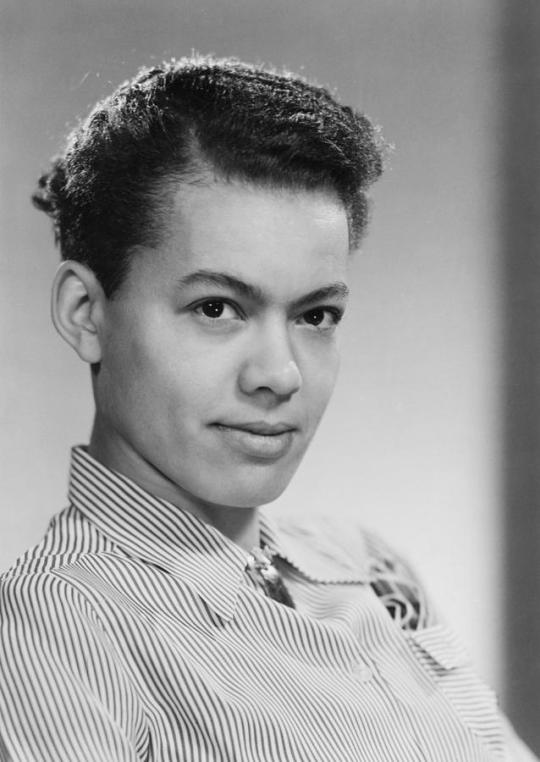
“I . . . feel that you are the sort of person who prefers to be accepted as a human being and not a human paragon”
-- Pauli Murray to Eleanor Roosevelt, December 6, 1938
Student activist Pauli Murray and Eleanor Roosevelt developed a close friendship that lasted over two decades. The two first met briefly in 1934, when ER visited a women’s CCC camp where Murray was enrolled. Four years later, Murray sent this letter to the First Lady—the start of an extended correspondence that would continue until ER’s death in 1962.
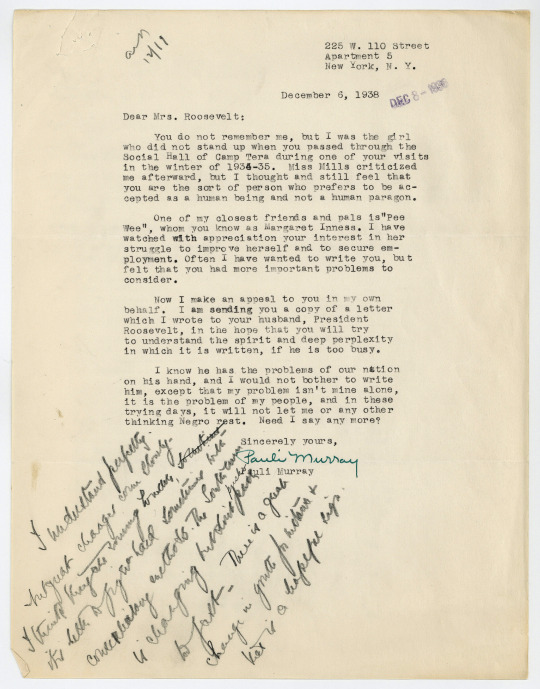
Murray enclosed a long letter she had sent to FDR “in the hope that you will try to understand the spirit and deep perplexity in which it is written, if he is too busy.”
Eleanor responded quickly to Murray. “I have read the copy of the letter you sent me,” she wrote, “and I understand perfectly, but great changes come slowly. I think they are coming, however, and sometimes it is better to fight hard with conciliatory methods. The South is changing, but don’t push too fast. There is a great change in youth, for instance, and that is a hopeful sign.”
Document: AR 2023.1.82/Franklin D. Roosevelt Presidential Library and Museum
Learn more about Pauli Murray in our current special exhibition BLACK AMERICANS, CIVIL RIGHTS, AND THE ROOSEVELTS, 1932-1962.
16 notes
·
View notes
Text
21 notes
·
View notes
Text
https://x.com/ProenzaColes/status/1703394281744892098?t=zJ10AU4Pgq5lXyyqHgDhWA&s=09
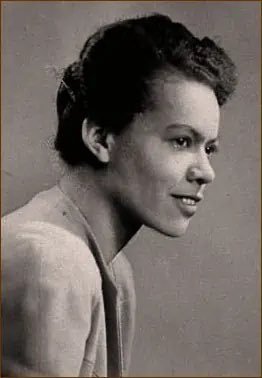

9 notes
·
View notes
Text

"True emancipation lies in the acceptance of the whole past in deriving strength from all of my roots, in facing up to the degradation as well as the dignity of my ancestors."
As we come to the end of Pride Month 2023, I wanted to devote a little time to the remarkable life of Rev. Anna Pauline "Pauli" Murray --civil rights attorney, Episcopal priest, scholar, and advocate. Born in 1910 Baltimore, their mother tragically died when Murray was only four, and their father succumbed to depression and was later murdered in a mental hospital, and so Murray was raised by an aunt and grandparents, in a time when the threat of violence from the Ku Klux Klan was never too far away. Murray later moved to New York City and graduated from Hunter College in 1933 (as Columbia College did not at the time admit women). Throughout the 1930's Murray grappled with sexual and gender identity --this is in fact when they took on the preferred male-identifying name of "Pauli." A gifted photographer but an even more prolific author, Murray worked as a teacher with the New York City Remedial Reading Project, which offered a great deal of opportunity to write and publish. Among other publications, Pauli's essays and articles about civil rights would regularly appear in The Crisis and in Common Sense (both publications of the NAACP).
Pauli took the unusual (and risky!) step of petitioning to apply to graduate school at the University of North Carolina (current events alert!) --at the time an all-white institution. Such a prospect was considered sufficiently unobtainable that even the NAACP declined to actively support this effort. Pauli had in the meantime cultivated the acquaintance of then-First Lady Eleanor Roosevelt, as well as A. Philip Randolph (see Lesson #68 in this series); associations which would later carry consequences. Pauli is listed as one of the founders of CORE (Congress of Racial Equality), along with Bayard Rustin (see Lesson #5 in this series), and James Farmer (Lesson #17). In 1943 they published a hugely important essay: "Negroes Are Fed Up;" and also a poem, Dark Testament, both of which spoke to the Harlem Race Riot of 1935.
In 1944 Murray graduated from Howard University Law School --while largely identifying as a man but still presenting as a woman, Murray famously coined the expression "Jane Crow" to describe the experience. They then applied to Harvard Law for an advanced degree on a Rosenwald Fellowship but was turned down --reportedly not due to racism (exact same current events alert!) but definitely due to sexism. They instead opted for the University of California Boalt School of Law; their graduate thesis was titled "The Right to Equal Opportunity in Employment." In 1945 Murray was named deputy attorney general for the state of California; the first African American to hold that post. In 1951 Pauli published States' Laws On Race and Color, a book that would later be described by Thurgood Marshall as the "Bible" for civil rights litigation, and was conspicuously referenced during Brown v. Board of Education arguments.
In 1952 the scourge of McCarthyism caught up with Murray and cost them a number of prestigious posts due to affiliation with "radicals" like Marshall, Randolph, and particularly Ms. Roosevelt. Unbowed, Pauli went on to publish the gripping biographical account Proud Shoes, which led in turn to a job offer in the litigation dept. of Paul, Weiss, Rifkin, Wharton, and Garrison (as in, Lloyd), where she would meet lifelong partner Irene Barlow. In 1960 Pauli was appointed by President John F. Kennedy to the Committee on Civil And Political Rights, but the issue of intersectionality was never far from their priorities; notably in 1963 Murray took Bayard Rustin, A. Philip Randolph, and Martin Luther King to task for not including a single woman speaker at the March On Washington. Perhaps the most fascinating coda to this remarkable life comes in 1977, when in the wake of Irene Barlow's passing, Murray became the very first African-American woman Episcopal priest. Pauli died in 1985, having never come out publicly.
For a comprehensive listing of Pauli's writings, visit the Pauli Murray Center for History and Social Justice: https://www.paulimurraycenter.com/paulis-writing
12 notes
·
View notes